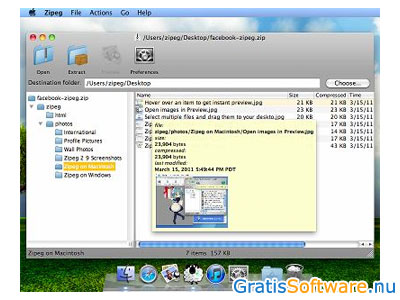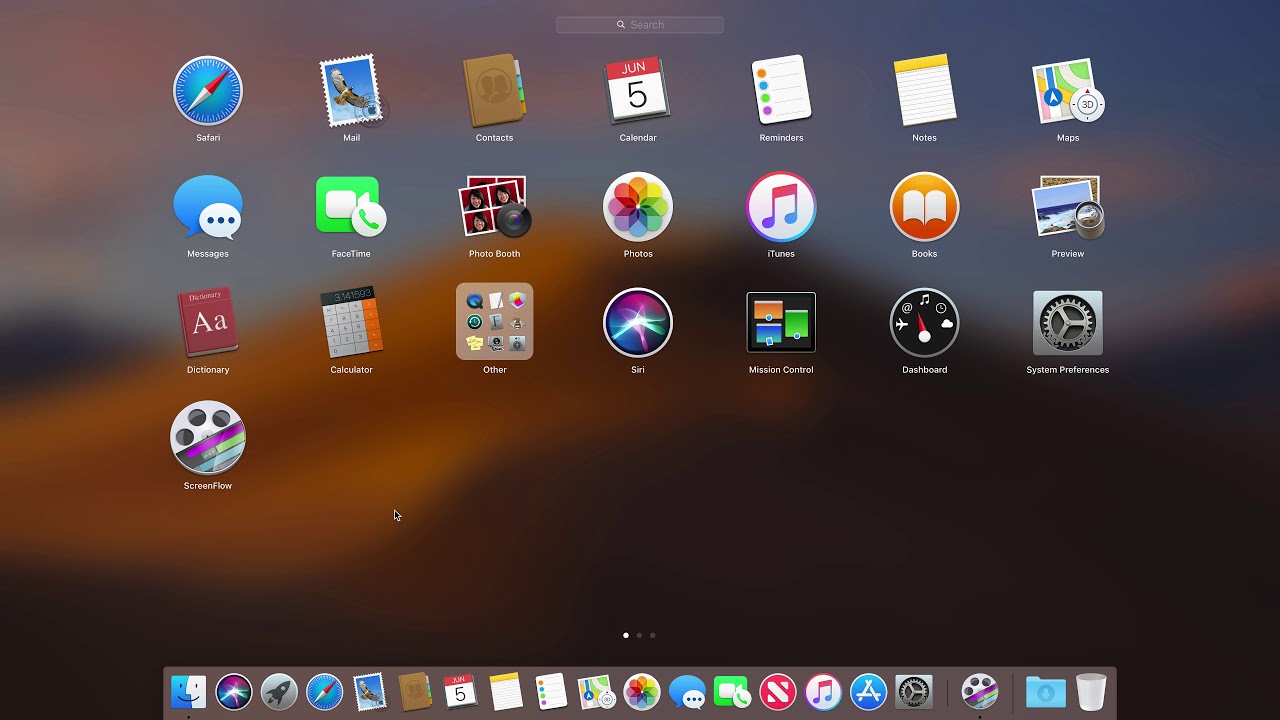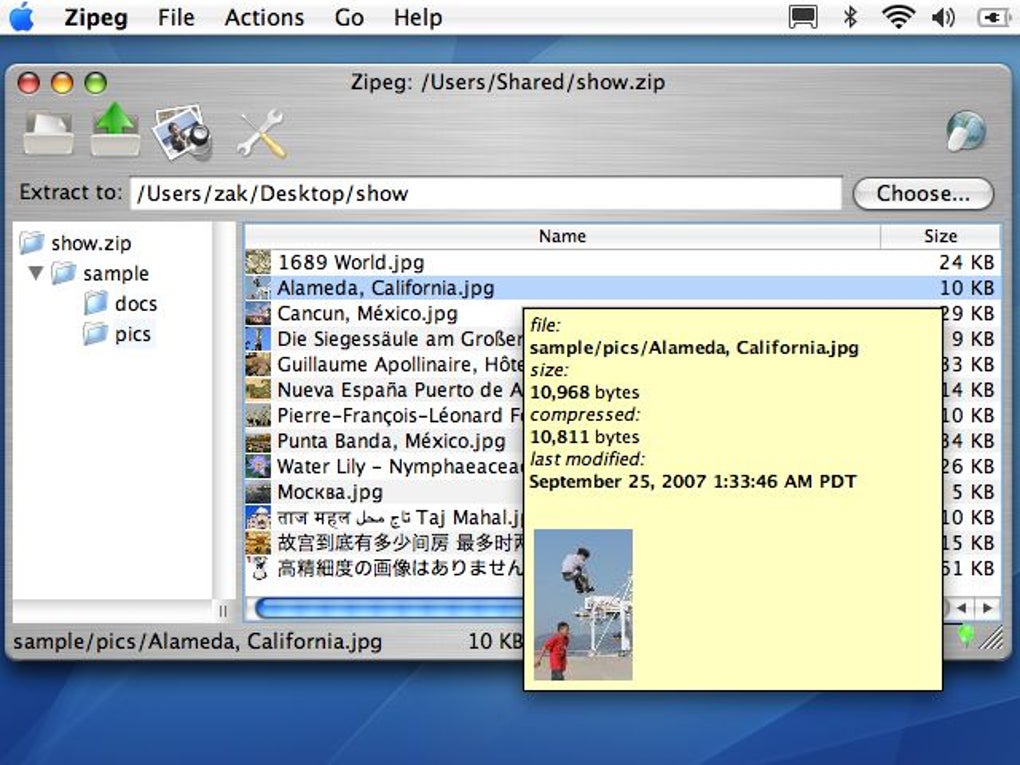Zipeg doesn't allow the creation of new archives, but it handles unzipping files just fine. When the program first opens, you get to choose which file extensions you want to be associated with the program so that you can be sure that Zipeg is the one that opens all of your archives. Zipeg for Mac; Zipeg for Windows; Browse and extract zip files. If you have to decompress files regularly, especially image files, you may find Zipeg interesting. Zipeg 2.9.4.1316 Zipeg is free universal.rar and.zip file opener. Magican 1.4.8 One-Click to clean, optimize and speed up your entire Mac. CrossOver 13.2 Windows applications on MAC.
| Original author(s) | Dag Ågren |
|---|---|
| Developer(s) | Circlesoft, MacPaw[1] |
| Stable release | |
| Repository | none |
| Operating system | macOS, Linux using GNUstep libraries, and command line only on Microsoft Windows, Linux, macOS |
| Available in | 18 languages |
English, Arabic, Bulgarian, Czech, Dutch, French, German, Hungarian, Italian, Japanese, Latvian, Norwegian Bokmål, Polish, Portuguese, Russian, Simplified Chinese, Spanish, Turkish | |
| Type | File Extractor / Decompressor |
| License | Proprietary since acquisition[2] Formerly LGPL |
| Website | theunarchiver.com |
The Unarchiver is a proprietary freeware[2]data decompression utility, which supports more formats than Archive Utility[3] (formerly known as BOMArchiveHelper), the built-in archive unpacker program in macOS. It can also handle filenames in various character encodings, created using operating system versions that use those character encodings.[4] The latest version requires Mac OS X Lion or higher. The Unarchiver does not compress files.[5]
The corresponding command line utilities unar and lsar is free (libre) software licensed under the LGPL[6] run on Microsoft Windows, Linux, and macOS.[7]
A main feature of the Unarchiver is its ability to handle many old, obscure formats like StuffIt as well as AmigaOS disk images in LZH, LZX, and so on. This is credited in its source code to the use of libxad, an Amiga file format library. Ågren also worked to reverse engineer the StuffIt and StuffIt X formats, and his code was one of the most complete open source implementations of these proprietary formats.
References[edit]
- ^'MacPaw acquires The Unarchiver Mac app, will keep it updated & free'. 9to5Mac. 27 July 2017.
- ^ ab'End User License Agreement (EULA) for MacPaw Products. Disclaimer and Limitations'. MacPaw.com. Retrieved 2019-01-04.
- ^Popescu, George. 'The Unarchiver – A Better Way to Decompress Archives'. Softpedia. Retrieved 15 September 2016.CS1 maint: discouraged parameter (link)
- ^Seff, Jon. 'Mac Gems: The Unarchiver is a free, robust file-extraction utility'. Macworld. Retrieved 15 September 2016.CS1 maint: discouraged parameter (link)
- ^Fenton, William. 'The Unarchiver (for Mac)'. PC Magazine. Retrieved 15 September 2016.CS1 maint: discouraged parameter (link)
- ^'MacPaw/XADMaster is licensed under the GNU Lesser General Public License v2.1'. 2018-03-21. Retrieved 2020-06-01.
- ^'Command line tools'. The Unarchiver. Retrieved 2 March 2019.CS1 maint: discouraged parameter (link)
External links[edit]
| Wikimedia Commons has media related to The Unarchiver. |
RPM originally stands for Red Hat Package Manager. Nnow, RPM is a package management system. The name RPM variously refers to the .rpm file format, files in this format, software packaged in such files, and the package manager itself. RPM was intended primarily for Linux distributions; the file format is the baseline package format of the Linux Standard Base. RPM is distributed under the terms of the GPL.
Even though it was created for use in Red Hat Linux, RPM is now used in many GNU/Linux distributions. It has also been ported to some other operating systems, such as Novell NetWare (as of version 6.5 SP3) and IBM's AIX (as of version 4).
An RPM package can contain an arbitrary set of files. The larger part of RPM files encountered are 'binary RPMs' (or BRPMs) containing the compiled version of some software. RPM files however may also contain the source code, then called 'source RPMs' (or SRPMs) used to produce a package. SRPMs have an appropriate tag in the file header that distinguishes them from normal (B)RPMs, causing them to be extracted to /usr/src on installation. SRPMs also customarily carry the file extension '.src.rpm' (.spm on file systems limited to 3 extension characters, i.e. old DOS FAT).
The format is binary and consists of four sections:
- The lead, which identifies the file as an RPM file and contains some obsolete headers.
- The signature, which can be used to ensure integrity and/or authenticity.
- The header, which contains metadata including package name, version, architecture, file list, etc.
- A file archive (the payload), which usually is in cpio format, compressed with gzip. The rpm2cpio tool enables retrieval of the cpio file without needing to install the RPM package.
- More recent versions of RPM can also use bzip2, lzip, lzma, or xz compression.
- RPM 5.0 format supports using xar for archiving.
Open/Extract RPM File on Windows
Easy 7-Zip opens/extracts RPM file easily on Windows. The Easy 7-Zip was developed based on 7-Zip. 7-Zip is a famous open source file archiver. The Easy 7-Zip is an easy-to-use version of 7-Zip. The open source freeware keeps all features of 7-Zip and adds a few useful features that makes the software more user-friendly.
Easy 7-Zip works on Windows 10/8.1/8/7/Vista/2008/2003/XP/2000 (both 32-bit and 64-bit compatible).
- Free Download Easy 7-Zip
- Install Easy 7-Zip by step-by-step instructions
- The installation will associate RPM with Easy 7-Zip automatically
- Double-click on RPM file to open RPM file with Easy 7-Zip
- Alternatively, Right-click on RPM file on Windows Explorer
- Done
You will see files or folders within the RPM file then, click button Extract to extract the RPM file.
And then, choose Extract files..., Extract Here, or Extract to 'folder' to extract the RPM file.
Easy 7-Zip Download Links:

You can try other alternative freeware that opens/extracts RPM file on Windows. For example:
- PeaZip
- TUGZip
- B1 Free Archiver
- IZArc
- Zipeg
- Universal Extractor
- FreeArc
- Bitser
Open/Extract RPM File on Mac
B1 Free Archiver opens/extracts RPM file on Mac. B1 Free Archiver is a free software for creating archive folder and extracting archive file. B1 Archiver works on all platforms - Windows, Linux, Mac and Android. The freeware supports most popular formats including RPM.
B1 Free Archiver is compatible with:
- Mac OS X 10.9 Mavericks
- Mac OS X 10.8 Mountain Lion
- Mac OS X 10.7 Lion
- Mac OS X 10.6 Snow Leopard
Alternative freeware that opens/extracts RPM file on Mac.

- The Unarchiver
- Zipeg for Mac
- EZ 7z
- 7zX
Open/Extract RPM File on Linux
RPM (RPM Package Manager) is a popular utility for installing software on Unix-like systems, particularly Red Hat Linux.
Install RPM package on Linux, type:
| # rpm -ivh package.rpm |

Upgrade RPM File, type:
| # rpm -Uvh package.rpm |
Remove (Erase) RPM package, type:
| # rpm -ev package_name |
List all installed packages, type:
| # rpm -qa |
To extract a RPM package files without installing it, you need to install rpm2cpio. rpm2cpio extracts cpio archive from RPM Package Manager (RPM) package.
Zipeg For Mac 2020
Install rpm2cpio on CentOS and Fedora
| # yum install rpm2cpio |
Install rpm2cpio on Debian and Ubuntu
| # apt-get install rpm2cpio |
Extract RPM file on Linux
| $ mkdir pkgname $ cd pkgname $ rpm2cpio ../package.rpm | cpio -idmv |
cpio arguments:
Download Zipeg For Mac
- -i: extract
- -d: make directories
- -m: preserve modification time
- -v: verbose
List files in RPM package:
| $ rpm2cpio package.rpm | cpio -t |
Zipeg Mac Free
Tips: on Debian or Ubuntu, you can convert RPM to DEB package with alien, and process DEB package with dpkg; or process RPM file directly using smart.
Zipeg For Mac
Copyright © 2013-2017 James Hoo All rights reserved.